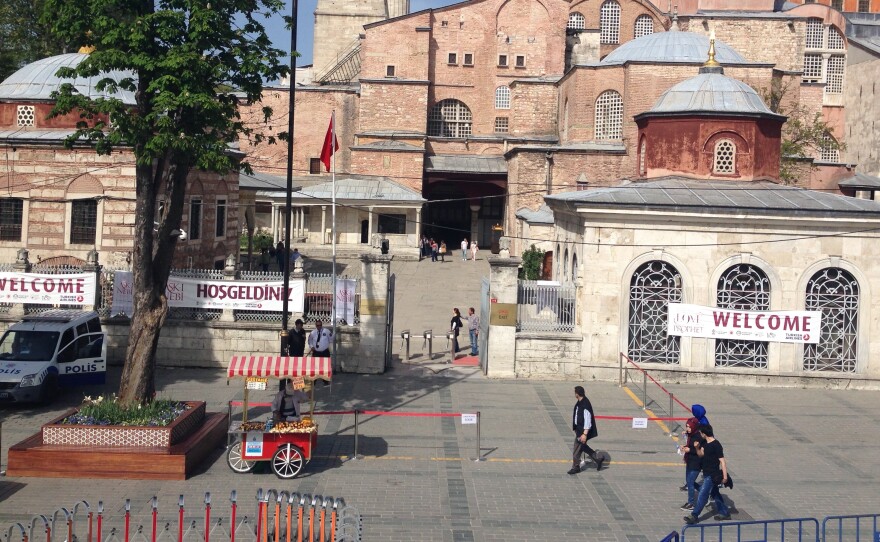
Two years ago in Istanbul, I dragged Selcuk Altun, a Turkish author and lover of all things Byzantine, to the Hagia Sophia, a 6th century church that's now a museum. But we couldn't even get close. Altun took one look at the mass of sweating humanity blocking the entrance and decided to do the interview outside. But this year, the change is astonishing.
The square in front of the Hagia Sophia is almost empty – a lonely seller of roasted chestnuts and corn calls it the worst he's seen.
Tourism contributes some $30 billion per year, about 4 percent of Turkey's economy. But Turks say tourism revenue will be down sharply this year, and possibly next year, too. A massive, ongoing migrant crisis, a bitter feud with Russia and, perhaps most damaging of all, a series of deadly terrorist attacks — including one in January, right here in the heart of Istanbul's Old City — have seen visitor numbers plummeting.
A few are still coming, including Australian Amanda O'Callaghan and her family. She can laugh about it now, but says they seriously considered canceling after the most recent suicide bombings.
But "we'd already paid most of our money, and we weren't going to get it back," she says with a laugh. Now that she's here, "Oh, yes, of course, it's fantastic," she says. "Something I've wanted to do for 20 years."
The O'Callaghans wander off among colorful beds of flowers, as musicians celebrating the annual tulip festival strike up a tune. The band is lucky to have the gig. All around them, idle tour guides, bus drivers and waiters on extended cigarette breaks wonder how close they are to being laid off.
Several major cruise lines have altered their itineraries to avoid Istanbul. That means several thousand visitors a day are going elsewhere. Turkish media report that hundreds of hotels, possibly more than 1,000, are up for sale — especially along the Aegean coast, where a Russian ban on holidays in Turkey is taking a heavy toll. The ban was imposed after Turkey shot down a Russian warplane in November.
Signs of the slowdown are everywhere at the historic Istanbul market known as the heart of the Turkish economy since Ottoman times – the Grand Bazaar. The bazaar is a maze of galleries, cafes and shops offering everything from cheap bric-a-brac to rare antiques and artisanal treasures from Anatolia, Central Asia and beyond.
At the Adnan and Hasan carpet shop, longtime rug seller Erol Avci says sure, he'll answer a few questions – if he can quiz the reporter too:
"We can ask you questions also?" he says.
"Yes – would I like to buy something?" I joke.
He laughs. "No," he says. "Can we come to America and sell carpets there?"
He's not joking. "This is the new thing now," he says.
Avci knows dealers who spent the entire winter in America, bringing their wares to folks unwilling to come to Turkey. He may hit the road himself. This shop has been here for nearly 40 years, and he's never seen things so bad.
That's not the salesman in him talking, he insists. "It is a custom for a vendor to cry all the time, 'No business!' You know, if you make a million-dollar turnover that month, you say, 'Okay, no complaints, but...' "
He laughs and says, "But this is really to cry. Yes. Yes. Now we come to the real thing."
Like farmers anxiously searching the sky for rain clouds, these Turks are wondering how long this tourist drought will last – and whether they can hang on until it's over.
Copyright 2016 NPR. To see more, visit http://www.npr.org/.






